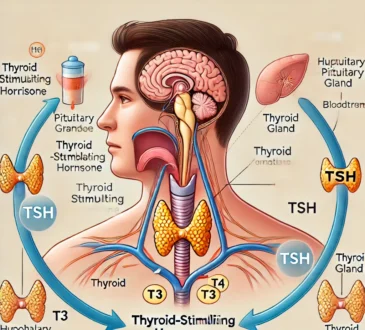400views
Improving mental health requires consistent effort, self-awareness, and sometimes support from others. Here are some practical, evidence-based practices to enhance mental well-being:
1. Prioritize Self-Care
- Get adequate sleep: Aim for 7–9 hours of quality sleep each night.
- Eat a balanced diet: Include foods rich in omega-3s, whole grains, fruits, and vegetables.
- Exercise regularly: Engage in physical activity for at least 30 minutes, 3–5 times a week; activities like walking, yoga, or dancing can also boost your mood.
2. Practice Mindfulness
- Meditation: Spend 10–15 minutes daily meditating to improve focus and reduce anxiety.
- Deep breathing exercises: Use techniques like 4-7-8 breathing to manage stress.
- Gratitude journaling: Write 3 things you’re grateful for each day.
3. Build Strong Relationships
- Stay connected: Spend time with family, friends, or loved ones.
- Join communities: Participate in hobbies, support groups, or social clubs.
- Seek support: Don’t hesitate to ask for help if you’re struggling emotionally.
4. Manage Stress
- Set boundaries: Learn to say “no” to unnecessary obligations to protect your energy.
- Break tasks into smaller steps: This reduces overwhelm and procrastination.
- Unplug: Take breaks from technology or social media when it feels overwhelming.
5. Challenge Negative Thoughts
- Cognitive reframing: Replace unhelpful thoughts with more constructive ones.
- Self-compassion: Treat yourself with the same kindness you would offer a friend.
- Therapeutic techniques: Consider journaling to process and understand emotions.
6. Engage in Meaningful Activities
- Pursue hobbies: Rediscover activities that bring joy, like art, music, or sports.
- Volunteer: Helping others can create a sense of purpose and connection.
- Learn something new: Challenge yourself with a new skill or passion project.
7. Seek Professional Support
- Therapy: Speak to a therapist or counselor to explore and resolve deeper issues.
- Medication: Consult a doctor if you need support for conditions like depression or anxiety.
- Workshops: Attend mental health seminars or online programs for additional guidance.
8. Incorporate Rest and Fun
- Schedule downtime: Plan time for activities that relax and rejuvenate you.
- Laugh more: Watch funny videos, read a joke book, or spend time with playful people.
- Nature walks: Spend time outdoors to benefit from fresh air and a calming environment.
9. Develop Emotional Resilience
Understanding the Causes of Heart Failure: Key Factors and Underlying Diseases
- Accept imperfection: Recognize that it’s okay to make mistakes and that perfection isn’t attainable.
- Focus on what you can control: Let go of what’s beyond your influence.
- Practice forgiveness: Release resentment toward yourself or others.
10. Establish Healthy Routines
- Start your day intentionally: Create a morning routine that sets a positive tone.
- Set daily goals: Even small, achievable goals provide structure and accomplishment.
- Stick to regular breaks: Avoid burnout by scheduling time for rest during work or study.
11. Explore Creative Outlets
- Write: Journaling, creative writing, or poetry can help process emotions.
- Create art: Painting, drawing, or crafting can serve as an emotional release.
- Play music or dance: Engage with rhythm and movement to uplift your mood.
12. Improve Your Environment
- Declutter your space: A tidy environment promotes a calmer mind.
- Add plants or natural elements: Nature indoors can improve focus and reduce stress.
- Personalize your surroundings: Surround yourself with items that bring joy or inspiration.
13. Strengthen Your Mind
- Read: Dive into books on self-help, philosophy, or fiction to expand your perspective.
- Practice gratitude visualization: Imagine things you’re grateful for as vividly as possible.
- Challenge yourself mentally: Solve puzzles, play strategy games, or learn a new language.
14. Embrace Technology Wisely
- Use mental health apps: Try apps like Calm, Headspace, or Moodpath for guided support.
- Limit doomscrolling: Set boundaries on social media use to avoid negative content.
- Digital detoxes: Take short breaks from devices to reconnect with the present.
15. Develop Healthy Coping Mechanisms
- Replace harmful habits: Swap unhealthy coping mechanisms (e.g., excessive alcohol) with positive ones.
- Identify triggers: Reflect on what situations or environments negatively impact your mood.
- Have a “go-to” self-soothing activity: Examples include listening to calming music or taking a warm bath.
16. Foster a Growth Mindset
Understanding the Causes Behind the Rise in Carbon Dioxide Levels
- View challenges as opportunities: Reframe setbacks as learning experiences.
- Celebrate small wins: Acknowledge even minor progress to boost confidence.
- Practice affirmations: Use positive statements to rewire negative thought patterns.
17. Connect with Nature
- Forest bathing: Spend time in wooded areas for a sense of tranquility.
- Gardening: Nurturing plants can be therapeutic.
- Star gazing or sunrise watching: These quiet moments can help ground you.
18. Nurture Your Spiritual Side
- Meditation retreats: Explore opportunities to deepen mindfulness.
- Reflect on values: Identify what gives your life purpose and align your actions accordingly.
- Practice prayer or gratitude: These can provide comfort and clarity.
19. Learn to Let Go
- Release past regrets: Focus on the present instead of dwelling on what cannot be changed.
- Limit comparisons: Avoid measuring your worth against others’ successes.
- Forgive yourself: Treat setbacks with understanding and patience.
20. Build a Support Network
- Stay accountable: Share your mental health goals with a trusted friend or mentor.
- Join online communities: Engage with people who share similar challenges or interests.
- Seek mentorship: Learn from those who’ve navigated similar struggles.
21. Develop Financial Peace
- Create a budget: Financial stability reduces unnecessary stress.
- Save for mental health needs: Prioritize therapy, wellness programs, or vacations.
- Simplify expenses: Avoid overburdening yourself with debt or material expectations.
22. Explore Alternative Therapies
- Nature-based therapy: Activities like eco-therapy or animal-assisted therapy.
- Creative therapies: Drama therapy, art therapy, or music therapy can unlock emotions.
- Somatic practices: Try body-based approaches like tai chi, massage, or EMDR therapy.
23. Reflect Regularly
- Monthly mental health check-in: Assess your progress and areas of improvement.
- Vision board: Visualize and document what you want to achieve for emotional fulfillment.
- Life audit: Reevaluate priorities, relationships, and goals periodically.
24. Develop Humor and Playfulness
- Embrace play: Engage in games or activities that make you laugh or feel carefree.
- Watch comedy: Laughter therapy has been shown to improve mood and immune function.
- Be spontaneous: Say “yes” to fun and unplanned adventures when they arise.
25. Plan for Mental Health Crises
- Create a crisis plan: Identify trusted contacts, calming techniques, and emergency resources.
- Save helpline numbers: Keep access to mental health hotlines and counselors.
- Practice grounding techniques: Use the 5-4-3-2-1 method to stay present during anxiety episodes.
add a comment









